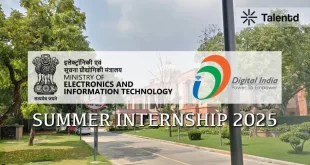Cyber Offences Quiz by Ministry of Education and Information Technology | Government Free Certificate
Hi learners, I am back with an amazing opportunity for you where you will get a government certification on Cyber Offences organized by the Ministry of Electronics and Information Technology (MeitY).
Terms and Conditions:
- Please enter your name correctly as same will be displayed on certificate.
- Users who scores 50% or above marks are eligible for getting certificate within maximum of 3 attempts.
Here are the Questions and Answers:
Question 1: When online posts are motivated by ones extreme biased opinion on other persons race, religion, sex, disability, gender, food and other preferences. What is it known as?
- Cyber stalking
- Cyber bullying
- Online Trolling
- Doxxing
Question 2: What is IT Act 66 D applicabe for?
- Child pornography
- Stealing data from computer
- Punishement for cheating by personation by using computer resource
- Forgery
Also Read: UPSC Fever Free Certificate | Machine learning Deep Learning Quiz Answers
Question 3: What is the recommended way of sharing your personal videos on Youtube channel?
- Share the videos publicly with everyone
- Share the videos Privately and restrict the privacy settings to ‘friends only’
- Do not share private videos at all online.
- None of the above
Question 4: What are the precautions to be taken to ensure that the webcam connected to our computer device is not hacked or misused by fruadsters?
- *Cover or switch off the webcam when not in use *Use VPN
- *Use updated software *secure your wifi with password
- *Avoid clicking on suspicious links *run a security scans regularly
- All the above
Question 5: What are the documents/enclosures required for filing a complaint against cyber crime either online on website or offline at cyber crime police station?
- E-mail id ; mobile number; address is sufficient.
- No documents are required we can file a complaint without any documents.
- Soft/hard copies of relevant documents like – screen shots of the online incidents as proof to support your claim; bank statements; Screenshot copy of URL of alleged contents etc.,
- None of the above
Question 6: Altering or changing the pictures of the person using tools available online is called ___.
- Flashing
- Morphing
- Hacking
- Stalking
Question 7: It was noticed that Amit was sending and receiving sexually explicit messages, pictures and videos. What kind of cyber offence is he involved in?
- Sextortion
- Sexting
- Cyber bullying
- Trolling
Question 8: Latha was travelling in local train when she received Whatsapp video call from an unknown number. What is the right action that can be suggested in this case and why?
- She should not pickup such calls from unknown numbers.
- She can pick up the call, as it can be a call from someone she knows, whose number is not saved.
Question 9: What are the ways in which can you file a complaint against cyber crime?
- a)
- i) online on the portal www.cybercrime.gov.in
- ii) Filing a written complaint at the nearest cyber crime police station.
- b)
- i) By giving a written complaint at any of the local police station.
- ii) By complaining to the consumer fourm.
- By providing complaint to the relevant authority/related officials in the organization
- Any of the above
Question 10: Is Morphing a punishable offence, if so under which Act is it covered and what is the penalty?
- Yes,it is punishable and is covered under the ITAA 2008, IPC and POSCO Act. If proved guilty a penalty of 3-10 years of imprisonment and fine of 5-10 lakhs is applicable.
- Yes, it is punishable and is covered ITCC 2000, NASSCOM. There is not penalty but only a hearing with restriction on use of resources.
- No it is not punishable
- I do not know
Question 11: What are the dangers of ‘Fake Profiles’?
- Spread of fake/false information,
- Malware and phishing attacks
- lure children and youngsters with fake identity.
- All the above
Question 12: Why is it recommended to disable your location option on social media accounts/platforms?
- This will help you to go anywhere without others knowledge.
- This will ensure that strangers are not able to track your whereabouts and know your location.
- To keep your activities secretive
- None of the above
 Priya Dogra – Certification | Jobs | Internships
Priya Dogra – Certification | Jobs | Internships


